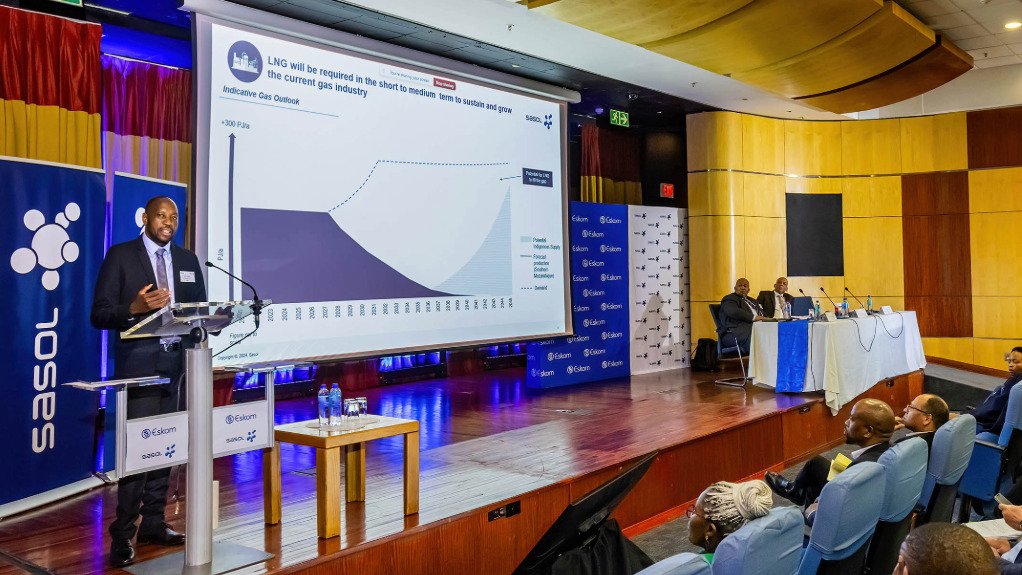Sasol and Eskom to explore demand anchors for LNG as part of effort to avert ‘gas cliff’


Sasol CEO Simon Baloyi presents a slide on the gas cliff during a briefing at Megawatt Park, while Eskom CEO Dan Marokane and Electricity and Energy Minister Dr Kgosientsho Ramokgopa (seated at far right) listen.
Eskom and Sasol have signed a memorandum of understanding (MoU) to jointly explore the potential to introduce liquified natural gas (LNG) to replace natural gas imports from southern Mozambique, which are currently set to decline sharply from 2027.
The MoU was signed by Eskom CEO Dan Marokane and Sasol CEO Simon Baloyi at a ceremony held at Eskom’s Megawatt Park, which was attended by Electricity and Energy Minister Dr Kgosientsho Ramokgopa.
Sasol announced in early September that the gas-supply plateau ahead of a so-called ‘gas cliff’ had been extended by a year from the initial timeline of mid-2026, and that work was under way to try to extend the plateau to mid-2028.
However, Baloyi stressed that these efforts had simply delayed the inevitable decline in gas imports from the Pande and Temane fields and should be seen as a bridge to the importation of LNG, particularly given that indigenous gas sources were unlikely to materialise in time.
Sasol had also resolved to play a central role in aggregating domestic demand to create the basis for LNG imports, as a way of providing gas users with longer-term certainty of supply, albeit at a far higher price relative to current prices.
“[The extension] has now given us space and scope to be able to bring in LNG . . . and that time must not be wasted,” Baloyi said at the signing ceremony.
He also insisted that Sasol’s plans could complement the aggregator initiative being pursued by large gas consumers under the banner of the Industrial Gas Users Association of Southern Africa.
Non-Sasol domestic demand of up to 180 PJ/y is currently located mainly in Gauteng and KwaZulu-Natal, which is met through the Rompco pipeline from southern Mozambique to South Africa, as well as a pipeline to KwaZulu-Natal.
Such demand is not substantial enough to secure competitively priced LNG from international sources and, through the MoU, the prospect of “anchoring” that demand with gas-to-power (GtP) generation, including at repurposed coal plants within proximity to the Rompco pipeline, will be explored.
“The context of this MoU is on the back of seeking to exploit opportunities that may arise based on the infrastructure that already exists, namely the Rompco pipeline,” Marokane explained.
“It is this pipeline whose capacity will be redundant as indigenous gas from Mozambique declines, [and] the importation of LNG will take advantage of this installed infrastructure to access the markets that are already existing inland,” he added.
The gas would, thus, not be used to supply the open-cycle gas turbines that currently use diesel.
Marokane said the MoU would also provide Eskom with “optionality” to accelerate its GtP strategy. The State-owned company has indicated previously that it has a 20-GW-plus generation project pipeline that includes 4 GW of GtP, including a 3 GW project proposed for Richards Bay.
Eskom was, thus, paying close attention to the updating under way on the Integrated Resource Plan with a view to ensuring that there was scope for it to pursue such projects, with Marokane noting that it was already in the process of procuring solar PV and battery storage capacity at two power station sites, Komati and Lethabo.
Ramokgopa described the MoU as part of the country’s emergency response to the impending gas cliff and said that government intended to support the initiative through various government-to-government initiatives, including with Qatar, which had expressed its support for South Africa’s LNG ambitions.
In their joint statement, Eskom and Sasol indicated that they would also explore sourcing gas within South Africa, the Southern African Development Community, and other parts of the African continent.
No specific projects or timelines were provided with regards to implementing the MoU, with Marokane saying only that the work would be pursued within the timing constraint associated with the gas cliff.
Article Enquiry
Email Article
Save Article
Feedback
To advertise email advertising@creamermedia.co.za or click here
Press Office
Announcements
What's On
Subscribe to improve your user experience...
Option 1 (equivalent of R125 a month):
Receive a weekly copy of Creamer Media's Engineering News & Mining Weekly magazine
(print copy for those in South Africa and e-magazine for those outside of South Africa)
Receive daily email newsletters
Access to full search results
Access archive of magazine back copies
Access to Projects in Progress
Access to ONE Research Report of your choice in PDF format
Option 2 (equivalent of R375 a month):
All benefits from Option 1
PLUS
Access to Creamer Media's Research Channel Africa for ALL Research Reports, in PDF format, on various industrial and mining sectors
including Electricity; Water; Energy Transition; Hydrogen; Roads, Rail and Ports; Coal; Gold; Platinum; Battery Metals; etc.
Already a subscriber?
Forgotten your password?
Receive weekly copy of Creamer Media's Engineering News & Mining Weekly magazine (print copy for those in South Africa and e-magazine for those outside of South Africa)
➕
Recieve daily email newsletters
➕
Access to full search results
➕
Access archive of magazine back copies
➕
Access to Projects in Progress
➕
Access to ONE Research Report of your choice in PDF format
RESEARCH CHANNEL AFRICA
R4500 (equivalent of R375 a month)
SUBSCRIBEAll benefits from Option 1
➕
Access to Creamer Media's Research Channel Africa for ALL Research Reports on various industrial and mining sectors, in PDF format, including on:
Electricity
➕
Water
➕
Energy Transition
➕
Hydrogen
➕
Roads, Rail and Ports
➕
Coal
➕
Gold
➕
Platinum
➕
Battery Metals
➕
etc.
Receive all benefits from Option 1 or Option 2 delivered to numerous people at your company
➕
Multiple User names and Passwords for simultaneous log-ins
➕
Intranet integration access to all in your organisation

















